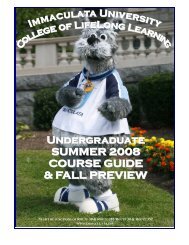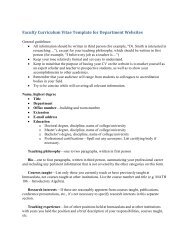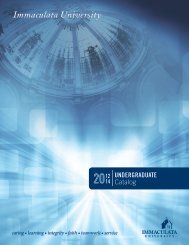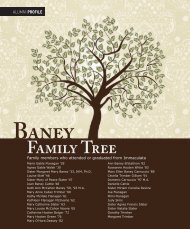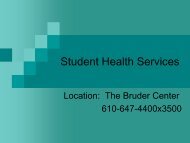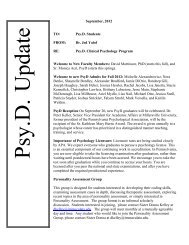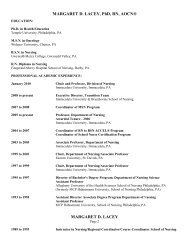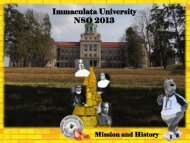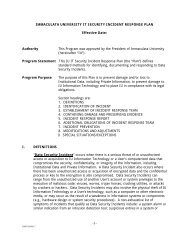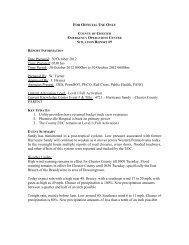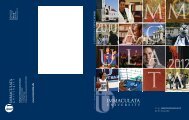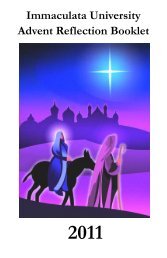8529 Cat.qxd - Immaculata University
8529 Cat.qxd - Immaculata University
8529 Cat.qxd - Immaculata University
You also want an ePaper? Increase the reach of your titles
YUMPU automatically turns print PDFs into web optimized ePapers that Google loves.
MINOR PROGRAMSIn addition to completing requirements for a major,baccalaureate students have the option of a minor concentrationoutside the major field. A minor is a focused program of studyconsisting of 18-22 credits designated by the department(s) offeringthe program. Course requirements for minors are outlined in theAreas of Instruction section of this catalog.A student desiring to pursue a minor should discuss these planswith the academic advisor and obtain permission of the advisor andof the designated minor advisor in the department of the minor. Astudent in the College of Undergraduate Studies should declare theintention to minor when declaring the major in the second semesterof sophomore year in the Office of the Director of AcademicAdvisement, or during the junior year. A student in the College ofLifeLong Learning declares this intention with the appropriateacademic advisor in the College of LifeLong Learning.CERTIFICATE PROGRAMSA student may opt to pursue a certificate program in a specificarea. Certificate programs are available in studio art, accounting,business, computers-in-business, computer graphic arts,management, foreign languages — French and Spanish; informationtechnology, specific certifications in information technologythrough corporate partnerships; international studies, liturgicalstudies, liturgy, Middle Eastern studies, paralegal, politics, pre-law,urban studies, social work, and theology.SECOND MAJORTo qualify for a second major within the same baccalaureatedegree, a student must:• fulfill the liberal arts core courses required for the secondmajor.• complete at <strong>Immaculata</strong> <strong>University</strong> the departmentalrequirements appropriate for the second major field ofconcentration.A second major within the same baccalaureate degree isidentified on the transcript.SECOND BACCALAUREATE DEGREETo qualify for a second baccalaureate degree, a student must:• fulfill the liberal arts core curriculum requirements for thesecond baccalaureate degree• complete at <strong>Immaculata</strong> <strong>University</strong> the departmentalrequirements appropriate for the major field of concentration.• maintain a minimum GPA of 2.00 (C)A second baccalaureate major is identified on a student’s transcript.A second diploma is issued only if the actual degree is different(e.g., B.A. vs. B.S.).In order to earn a second baccalaureate degree in the same major(e.g. B.A.and B.S. in Biology), a student must earn 126-128 for thefirst degree and an additional 32 credits in the major for the seconddegree.INTERNSHIP/FIELD EXPERIENCEThe Internship Program at <strong>Immaculata</strong> has as its fundamentalpurpose the integration of learning with life. Students have theopportunity to apply what they have learned, and to explore newplaces, to experience new people, and to broaden their perspectiveand personal goals. Through affiliation with an agency or acompany, students encounter professional role models and observethe practical aspects of their career interests. Such experiencesenable students to make more informed career choices at thecompletion of their college education.Internships are arranged on an individual basis through thedirection of the department chairperson or the faculty coordinator.Some programs carry academic credit, while others areextracurricular academic experiences.STUDY ABROADSuperior students may study abroad in their junior year whensuch study is particularly suited to their academic needs.<strong>Immaculata</strong> <strong>University</strong> co-sponsors study abroad programs atuniversities in Australia, Austria, England, France, Germany,Greece, Ireland, Italy, Mexico, Scotland, Spain and Wales. Thesesessions have been designed to meet the needs of students who wishto continue the study of a language or culture in another country.Students who achieve satisfactory grades may receive credit for thisprogram.Application for permission should be filed after the completionof 45 credits earned at <strong>Immaculata</strong> in either the office of the Dean,College of Undergraduate Studies or Dean, College of LifeLongLearning. The applicant should have a cumulative grade pointaverage of at least 3.25, and adequate facility to speak the languageof the country in which she/he plans to study. Educationalinstitutions and courses must be approved by the appropriatedepartment.Students paying comprehensive tuition are eligible to apply for a10% discount for study abroad programs offered through Arcadia<strong>University</strong>. <strong>Immaculata</strong> <strong>University</strong> participates in a scholarshipprogram for summer study abroad.Short-Term Study Abroad courses (with 1-4 week travel) listedas spring or fall courses at any SEPCHE institution are included inthe courses that are eligible for cross registration. Students whoqualify for the SEPCHE cross registration program are not chargedadditional tuition to cross register for one of these courses. Thestudent is responsible, however, for all the travel-related costs.GRANTS AND FELLOWSHIPS<strong>Immaculata</strong> <strong>University</strong> faculty and administration assist studentsin pursuing graduate school grants and fellowships. <strong>Immaculata</strong>graduates have won National Science Foundation, WoodrowWilson, and Fulbright scholarships and have received fellowshipsand assistantships for graduate study at the <strong>University</strong> ofPennsylvania, Stanford, MIT, Bryn Mawr, Princeton, <strong>Cat</strong>holic<strong>University</strong>, Fordham, John Carroll, Villanova, New York <strong>University</strong>,Seton Hall, Harvard, Boston College, Notre Dame, Northwestern,Vanderbilt, UCLA, Wisconsin, and Drexel to name a few.Academic Policies andProceduresACADEMIC INTEGRITY POLICYThe pursuit of truth and the exercise of honest, intelligentinquiry are values which guide academic freedom. Without themknowledge is corrupted and academic freedom, undermined. Thefollowing basic principles are inherent in academic honesty:• Each student’s work must be wholly his or her own.• Each student will give appropriate acknowledgement ofother’s work when incorporating that work into his or her own.• Students may not supply or receive unauthorized informationabout the form or content of an examination prior to its firstbeing given.• Students may not bring into a testing environment any writtenmaterial containing that information.• Students may not use electronic devices (calculator, cell phone, etc.)during testing unless specifically required for the examination.• Students may not submit the same, or essentially the same,24



